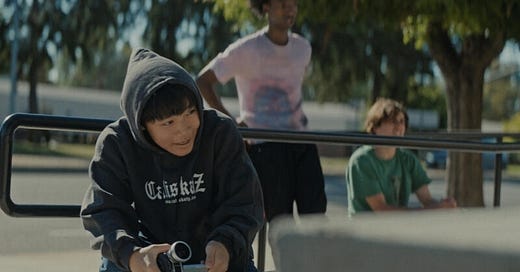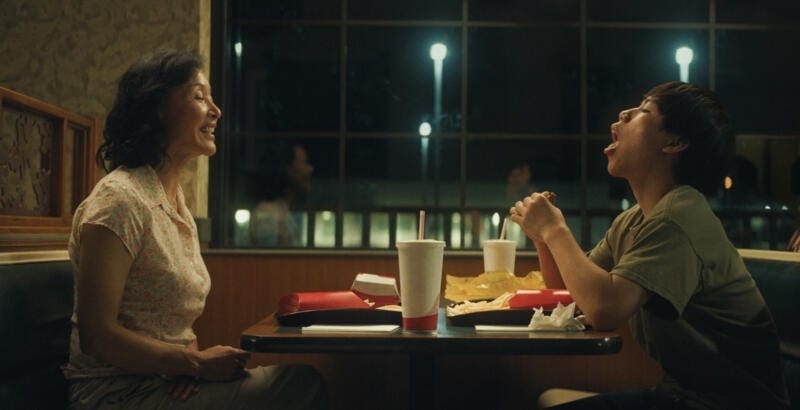TMS Movie Review: Dìdi
(Focus Features)
Sometimes a movie comes around and you instantly resonate with it on an emotional level. It’s easy for me to enjoy a good coming of age dramedy, but a lot of the time I don’t fully connect personally since so many of them are set in time periods I wasn’t a part of [i.e. the 1950s to 1980s]. But so much time has passed since my own childhood that we’re now getting teen dramas set when I was an adolescent myself. Sean Wang’s new movie, Dìdi—also his feature length directorial debut—takes place in the Bay Area suburbs during the summer of 2008, right before its pre-teen lead begins high school. Though I would have been finishing my first year of college when this story is set, I recognized and related to most of the 2000s zeitgeist referenced throughout the film.
Dìdi is centered around a Taiwanese-American family and was made with Wang’s own millennial memories of growing up with immigrants. Our main character, Chris (Izaac Wang), and his older sister, Vivian (Shirley Chen), speak fluent English with American accents, and hardly ever respond in Mandarin; while their mother, Chungsing (Joan Chen) and grandmother, Nai Nai (Chang Li Hua) only ever speak in Mandarin. Their exchanges are essentially the Chinese equivalent of Spanglish. Though the tale very much relates to Asian viewers, and I can imagine succeeds at doing so, Dìdi also reminds us how universal childhood experiences can be. If you were in middle school and/or high school in the ‘00s, so many moments on screen will take you back in time, both because of the retro pop culture as well as the usual incidents associated with growing up. Characters chatting on MySpace and early Facebook, Chris uploading videos on early YouTube, texting on flip phones, listening to Paramore, Hellogoodbye, Motion City Soundtrack and the Killers. Chris embarrassing himself while hanging out with his crush, Madi (Mahaela Park); Chris deleting all his cringey YouTube videos while trying to impress some high schoolers who skateboard; Chris and Vivian constantly pranking each other. There are lines of dialogue by Madi about Adam Shankman’s A Walk to Remember (2002) and classic Steven Spielberg blockbusters that could have been spoken by me twenty years ago.
(Focus Features)
Like Bo Burnham’s Eighth Grade (2018) and Jonah Hill’s mid90s (2018), Dìdi is an independent feature with no famous faces save for Joan Chen, whom you might remember from Bernardo Bertolucci’s The Last Emperor (1987) and the ABC series “Twin Peaks” (1990-1991). I’ve seen a few comments online accusing Wang of making ‘nostalgia bait’ for his generation, a la romanticizing the early internet and digital technology similar to how some Baby Boomer era coming of age features are accused of with analog media. Obviously perspective is subjective at the end of the day, but I found the writing and execution of Dìdi authentic since it is made by someone a part of that real world. I also want to highlight the lack of exposition in the dialogue, particularly regarding why the father of the family is on never-ending business trips back in Taiwan. The exchanges about his absence made me recall similarly vague lines about the absent father in Spielberg’s E.T.: the Extra-Terrestrial (1982), successfully making it clear with very little that these kids are essentially being raised by single mothers.
While I generally recommend Dìdi, I’m sure some parents are wondering about the R rating on the posters and ads. Much like critic Roger Ebert famously ranted about in his positive review for Rob Reiner’s Stand by Me (1986), Dìdi is being ‘punished’ by the ratings system for featuring 13-year-old boys who constantly use F-bombs and outdated slurs, even though real kids speak just like this, and especially kids from the past. There is no sex, nudity or graphic violence and only a brief [negative] experience with drugs here. So unless someone has an issue with their child being exposed to foul language, I think Dìdi is perfect for older kids and teenagers as much as adults.





